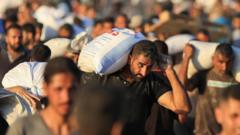The ongoing conflict between Israel and Iran has escalated dramatically, with Israel's defense minister promising intensified strikes in response to Iranian missile attacks on civilian hospitals in southern Israel. As both nations face mounting casualties, the situation raises urgent questions about international responses and potential negotiations.
Israel Intensifies Attacks Following Iranian Strikes on Hospitals and Civilians

Israel Intensifies Attacks Following Iranian Strikes on Hospitals and Civilians
Tensions escalate in the Middle East as Israel vows to increase military operations following missile attacks from Iran that targeted civilian facilities, including hospitals.
The situation in the Middle East has reached a boiling point as Israeli and Iranian military actions escalate dramatically. Following a missile strike by Iran that targeted the Soroka Medical Center, the largest hospital in southern Israel, Israel's Prime Minister Benjamin Netanyahu and Defense Minister Israel Katz have ordered a significant increase in military operations against Iranian targets. Katz emphasized the necessity of neutralizing threats posed by the Iranian regime to ensure Israel's security.
The missile strike on Soroka, which the Iranian Revolutionary Guards claimed was aimed at military facilities adjacent to the hospital, resulted in significant damage. Fortunately, the hospital had evacuated most patients in advance, reporting only minor injuries among a few individuals treated on-site at the time. This incident marks a notable shift in hostilities, as it was the first direct attack on an Israeli medical facility since the outbreak of the current conflict.
In retaliation, the Israeli military launched airstrikes against multiple sites in Iran, including the Arak nuclear facility. Iranian state media reported that these strikes did not cause serious damage, but the situation remains tense with fears of escalation. The incident has drawn commentary from global leaders, with U.S. President Trump hovering over potential American military involvement, prompting stern warnings from Iranian officials about the repercussions of U.S. engagement.
On the ground in Iran, a near-total internet blackout has made communication challenging, with reports emerging of traffic jams as people attempt to flee cities under threat of further strikes. Across Iran, civilian casualties are mounting, with reports estimating at least 224 deaths since Israel's military campaign commenced. Observations from residents illustrate a grim reality, where essential services such as food delivery and access to medical attention are severely hampered.
As international diplomatic efforts to mediate the conflict gain urgency, Iranian officials expressed a willingness to discuss ceasefire terms under the right conditions. However, Iran's supreme leader, Ayatollah Ali Khamenei, remains steadfast against negotiating while under threat, highlighting the complexities of potential dialogues aimed at de-escalation.
With both sides facing increasing casualties and disruptions, the urgency for a resolution to this prolonged conflict is more pressing than ever, raising questions about the longer-term implications for regional stability.
The missile strike on Soroka, which the Iranian Revolutionary Guards claimed was aimed at military facilities adjacent to the hospital, resulted in significant damage. Fortunately, the hospital had evacuated most patients in advance, reporting only minor injuries among a few individuals treated on-site at the time. This incident marks a notable shift in hostilities, as it was the first direct attack on an Israeli medical facility since the outbreak of the current conflict.
In retaliation, the Israeli military launched airstrikes against multiple sites in Iran, including the Arak nuclear facility. Iranian state media reported that these strikes did not cause serious damage, but the situation remains tense with fears of escalation. The incident has drawn commentary from global leaders, with U.S. President Trump hovering over potential American military involvement, prompting stern warnings from Iranian officials about the repercussions of U.S. engagement.
On the ground in Iran, a near-total internet blackout has made communication challenging, with reports emerging of traffic jams as people attempt to flee cities under threat of further strikes. Across Iran, civilian casualties are mounting, with reports estimating at least 224 deaths since Israel's military campaign commenced. Observations from residents illustrate a grim reality, where essential services such as food delivery and access to medical attention are severely hampered.
As international diplomatic efforts to mediate the conflict gain urgency, Iranian officials expressed a willingness to discuss ceasefire terms under the right conditions. However, Iran's supreme leader, Ayatollah Ali Khamenei, remains steadfast against negotiating while under threat, highlighting the complexities of potential dialogues aimed at de-escalation.
With both sides facing increasing casualties and disruptions, the urgency for a resolution to this prolonged conflict is more pressing than ever, raising questions about the longer-term implications for regional stability.





















